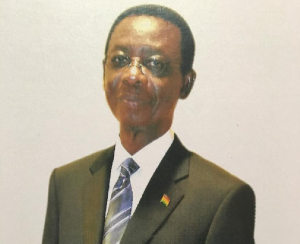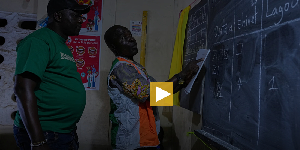(GNA Feature) By Clemence Okumah
Accra Aug.10, GNA - Child trafficking is becoming a serious problem in the country in spite of efforts to curb the menace. The practice is not only dehumanising but also amounts to abuse of the legal rights of children and a waste of human resource potential.
Article 35 of the UN Convention on the Rights of the Child states that the state is obliged to make every effort to prevent the sale, trafficking and abduction of children.
Mr Eric Appiah Okrah, National Project Coordinator, ILO/IPEC, says about 1.2 million children, both boys and girls, worldwide, are trafficked each year into exploitative work.
Consequently, the world body has taken positive steps to address the problem. It has decided to raise 10 million US dollars to finance a five-year project it initiated to fight human trafficking in China. Though child smuggling in Ghana could not be estimated in specific terms because of the informal and clandestine nature of the practice, the number of children trafficked from one part to the other and to neighbouring countries like Togo, Bukina Faso and Cote d'Ivoire yearly is on the increase.
In 1992, Kojo Ayama was arrested in Takoradi for attempting to smuggle 12 children, 10 girls and two boys to Cote d'Ivoire to be engaged on farms, in petty trading or to sell bread and iced water.
But the matter took a dramatic turn when parents of two of the victims, Ayawa Apawn and Ibrahim Abara, exonerated the suspect by saying that they consented to his act.
The parents said they were following a traditional practice whereby children are sent to their relatives who train them for a future livelihood.
This notwithstanding, the action of the two parents was unjustifiable. Though the practice of sending children to stay with relatives to attend school or learn a vocation was common in the past, trafficking children for laborious and hazardous work is unacceptable as it is in conflict with the Children's Act, 1998 of Ghana.
The Act spells out that the minimum age for the engagement of a person in hazardous work is 18 years. The separation of children from parents through abduction or trafficking could affect their upbringing and physical and psychological development.
A child has the right to live with his or her parents, unless this is deemed to be incompatible with the child's best interests. However, some parents, for economic reasons, sell their children or consent to people sending them to neighbouring countries to work as house helps, porters, bar operators, hotel attendants and some as prostitutes.
Surprisingly, while the practice is being abhorred as a criminal act, at another breath, some children willingly offer themselves to be smuggled outside the country to work without the approval of their parents.
The practice is common in the rural areas and it behoves the District Assemblies to protect the welfare and promote the right of children within their area of authority and ensure that within the district, governmental agencies liaise with one another on issues concerning children.
The Social Welfare and Community Development and District Assemblies, mandated to investigate cases of child trafficking and contravention of children's rights in general should provide the police with information about the practice for the appropriate action. It is, therefore, welcome news that the Ga District Assembly has shown its concern about the problem.
Mr. Samuel Nii Aryeetey Atto, District Chief Executive, said the assembly has formed a committee to investigate reported cases of child trafficking among fishing communities within the area. Despite the fact that the government is tirelessly working in conjunction with development partners to curb the menace, the situation requires more serious efforts.
Another option for solving the problem is to uproot causes of child trafficking. For instance, some of the children smuggled out of the country are wanderers, driven out of the home to the streets in search of refuge by either economic or social pressure. They, therefore, quickly accept offers from unsuspecting people to take them outside the country.
But there is some sort of relief programme the government has already set in motion plans for solving the problem. Dr Angela Ofori-Atta, Deputy Minister of Employment and Manpower Development, said the government had sourced a World Bank loan of 2.3 million dollars to combat child labour and the problem of street children.
Speaking on the occasion of the Second World Day Against Child Labour in Accra, the Deputy Minister said so far, the government has been able to rescue some children from exploitation and succeeded in getting a good number of them access to health care, education. It has also been able to re-integrate others into their respective families. She also said, the government have withdrawn and re-integrated 12,915 children working under bad and intolerable conditions, while others have been absorbed back into formal schools and vocational training centres.
Dr. Ofori-Atta said 415 children rescued from head porter jobs (kayaayo) and their foster parents (aunties) are receiving counselling to offer them better perceptions about life.
The celebration was significant as it came at a time child smuggling had reached an alarming proportion.
The fact that the celebration focused on child trafficking to create awareness on the dangers associated with the phenomenon also made the event significant.
In fact, due to huge profits earned by traffickers, there is abundant demand for children in the country and neighbouring countries. The media should, therefore, undertake a massive awareness campaign against child trafficking.
It is hoped that the authorities would liaise with governments of neighbouring Togo, Burkina Fasso and Cote d'Ivoire to find ways of prohibiting and eliminating trafficking of children as stated in the ILO Convention.
Since poverty has been identified as a major cause of child trafficking, government should draw concrete programmes and intensify efforts to assist the people, especially women to engage in economic activities to improve their standards of living. Individuals and non-governmental organisations, including religious bodies could invest to create more jobs for the people. The fight against child trafficking cannot succeed without a law against the practice. Parliament should, therefore, take positive steps to provide a legal framework for curbing the menace. If we should progress as a nation, we must stop the trafficking of our children, who form the bulk of the population and harness their potentials for national development. 10 Aug. 03
Opinions of Sunday, 10 August 2003
Columnist: GNA














